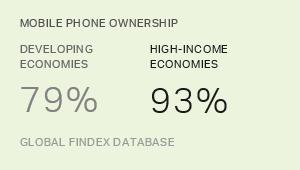PRINCETON, NJ -- Americans' confidence in the U.S. economy was better in the first half of September than in August, but that's ancient history now. Consumer attitudes took a sharp turn for the worse after Sept. 15, when Wall Street fell into a worrisome tailspin over the collapse of Lehman Brothers and the bailout of AIG, and remain highly negative at the month's end.
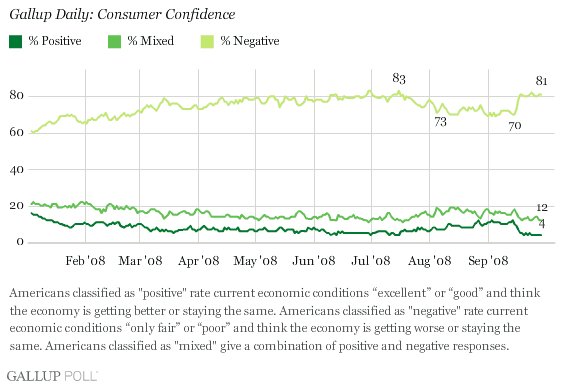
Gallup Poll Daily tracking underscores the degree to which economic attitudes can change quickly, making it essential to monitor consumer confidence on an ongoing basis rather than taking periodic measurements, or reporting monthly averages.
The percentage of Americans Gallup classifies as "negative" about the economy, now 81% according to Gallup's daily tracking from Sept. 27-29, nearly ties the record high of 83% seen at three points in July. The miniscule 4% currently classified as "positive" ties the lowest scores seen all year. Attitudes had improved to as much as 12% of Americans feeling positive about the economy and only 70% negative in Gallup tracking conducted Sept. 12-14.
These findings differ sharply from Tuesday's Conference Board report on consumer confidence, which stated that confidence improved slightly in September. That poll, based on a mail survey of U.S. households that are members of a consumer panel, had a reported cutoff date of Sept. 23, meaning most of its returns were probably received in the first half of the month, when confidence was indeed up over August.
Gallup Poll Daily Recent Weekly Averages
The weekly averages of consumer confidence in September help to underscore the degree to which consumer confidence changed in the middle of the month. Whereas a slightly improved 11% of Americans felt positively about the economy in each of the first two weeks of September, up from 9% in August, this fell to 6% from Sept. 15-21, and to 4% from Sept. 22-28 as President Bush and congressional leaders began negotiations over a $700 billion financial rescue package.
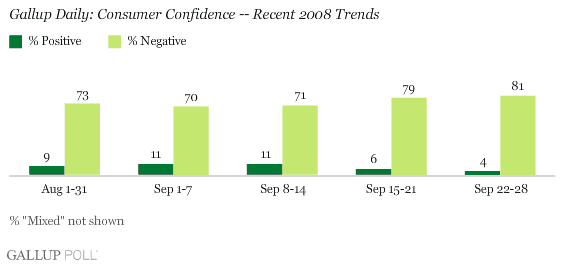
Gallup's consumer mood summary is a composite of Americans' answers to two questions about the economy: one asking for their ratings of current economic conditions, and the other asking about their perceptions of whether conditions are getting better or worse. Since mid-September, attitudes have grown more negative on both dimensions.
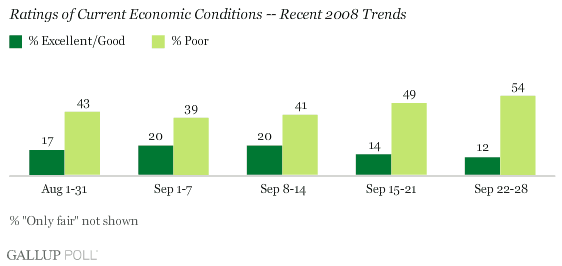
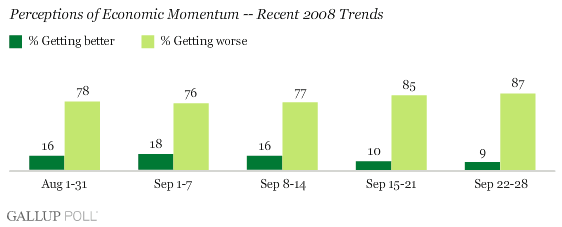
No Immediate "Plunge" Effect
The stock market showed its displeasure with Congress' failure to pass a bailout bill on Monday, Sept. 29, with the Dow Jones tumbling more than 700 points. Gallup polling that night showed no immediate effect on consumers' already-grim attitudes. As noted, the most recent three-day rolling average, from Sept. 27-29, shows 4% of Americans positive and 81% negative about the economy. This is identical to the reading from Sept. 26-28.
Survey Methods
For the Gallup Poll Daily tracking survey, Gallup is interviewing no fewer than 1,000 U.S. adults nationwide each day during 2008. The economic questions analyzed in this report are asked of a random half-sample of respondents.
The Sept. 27-29 results reported here are based on combined data from 1,549 telephone interviews. For results based on this sample, the maximum margin of sampling error is ±3 percentage points. Results based on weekly averages include interviews with more than 3,500 national adults, and have a margin of sampling error of ±2 percentage points. Results for the month of August are based on interviews with 15,796 national adults, and have a margin of sampling error of less than ±1 percentage point.
Interviews are conducted with respondents on land-line telephones (for respondents with a land-line telephone) and cellular phones (for respondents who are cell-phone only).
In addition to sampling error, question wording and practical difficulties in conducting surveys can introduce error or bias into the findings of public opinion polls.
To provide feedback or suggestions about how to improve Gallup.com, please e-mail feedback@gallup.com.
